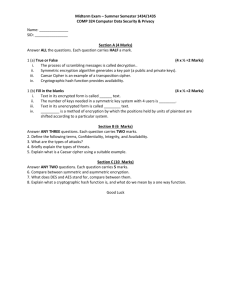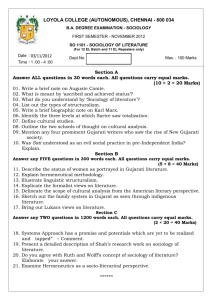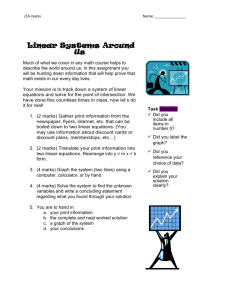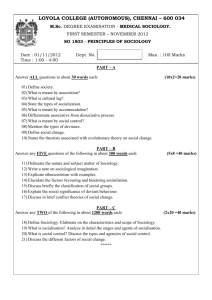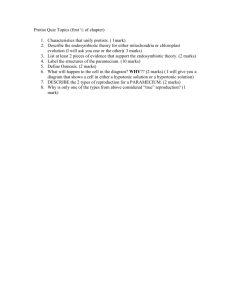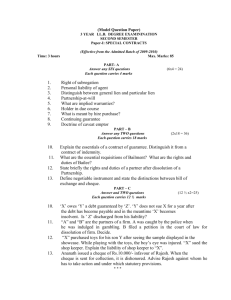(Model Question Paper)
advertisement
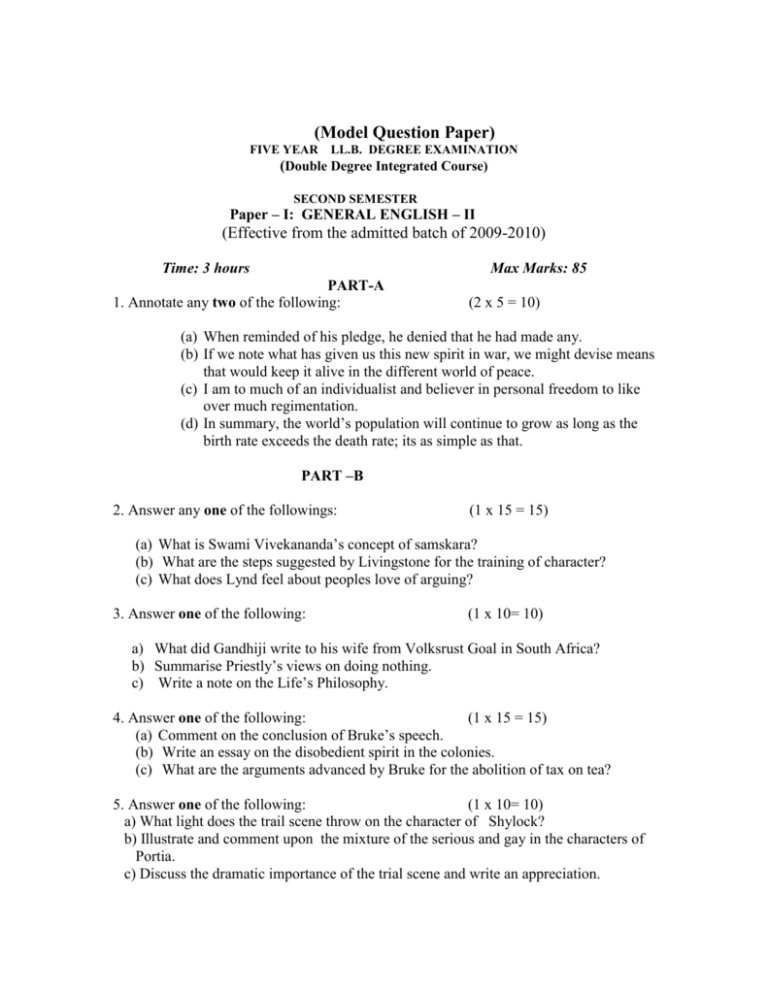
(Model Question Paper) FIVE YEAR LL.B. DEGREE EXAMINATION (Double Degree Integrated Course) SECOND SEMESTER Paper – I: GENERAL ENGLISH – II (Effective from the admitted batch of 2009-2010) Time: 3 hours Max Marks: 85 PART-A 1. Annotate any two of the following: (2 x 5 = 10) (a) When reminded of his pledge, he denied that he had made any. (b) If we note what has given us this new spirit in war, we might devise means that would keep it alive in the different world of peace. (c) I am to much of an individualist and believer in personal freedom to like over much regimentation. (d) In summary, the world’s population will continue to grow as long as the birth rate exceeds the death rate; its as simple as that. PART –B 2. Answer any one of the followings: (1 x 15 = 15) (a) What is Swami Vivekananda’s concept of samskara? (b) What are the steps suggested by Livingstone for the training of character? (c) What does Lynd feel about peoples love of arguing? 3. Answer one of the following: (1 x 10= 10) a) What did Gandhiji write to his wife from Volksrust Goal in South Africa? b) Summarise Priestly’s views on doing nothing. c) Write a note on the Life’s Philosophy. 4. Answer one of the following: (1 x 15 = 15) (a) Comment on the conclusion of Bruke’s speech. (b) Write an essay on the disobedient spirit in the colonies. (c) What are the arguments advanced by Bruke for the abolition of tax on tea? 5. Answer one of the following: (1 x 10= 10) a) What light does the trail scene throw on the character of Shylock? b) Illustrate and comment upon the mixture of the serious and gay in the characters of Portia. c) Discuss the dramatic importance of the trial scene and write an appreciation. PART –C 6. Write a letter on one of the following: (1 x 8 = 8) (a) Write a letter to a newspaper about the misusing of loud speakers. (b) To a friend describing a football match viewed in the stadium. (c) To the Municipal Commissioner on the necessity of public parks in a crowded city. 7. Make a précis of the following passage and give a suitable title. (1 x 7 = 7) A great part of Arabia is desert. Here there is nothing but sand and rock. The sand is so hot that you cannot walk over it with your bare feet in the daytime. Here and there in the desert are springs of water that come from deep down under the ground-so deep that the sun cannot dry them up. These springs are few and far apart, but wherever there is one, trees grows tall and gracefully, making a cool, green, shady place around the spring. Such a place is called an Oasis. These Arabs have the finest horses in the world. An Arab is very proud of his riding horse and loves him almost as much as he loves his wife and children. He never puts heavy loads upon his horse, and often lets him stays in the tent with his family. The camel is much more useful to the Arab than his beautiful horse, however, for he is much larger and stronger. One camel can carry as much as or more than two horses. The Arabs loads the camel with goods and rides him, too for miles and miles across the desert-just as if he were really the “Ship of Desert”, which he is often called. 8. Illustrate the difference in meaning in the following pair of words. (3 x 2=6) (a) Accept; Except (b) Collision; Collusion (c) Decent; Descent 9. Give one word substitute for each of the following: (a) (b) (c) (d) An area of ground in which dead bodies are buried Crime of marrying a person who was legally married. The cutting open and examination of a dead body i.e postmortem A man who helps someone else to commit a crime. * * * (4x1=4) (Model Question Paper) 5 YEAR LL.B. DEGREE EXAMININATION (Double Degree Integrated Course) SECOND SEMESTER Paper-II: Political Science – II FOUNDATIONS OF POLITICAL OBLIGATIONS Time: 3 hours (Effective from the Admitted Batch of 2009-2010) Max. Marks: 85 PART-A Answer any FIVE questions Each question carries 5 marks 1. 2. 3. 4. 5. 6. 7. 8. 9. (5 x 5 = 25) Sources of legitimacy Hobbes on “Obligation” Authority Class War Concept of Power Neo - Gandhian idea of political obligations Sovereignty Indian legal system Political thought of St. August PART – B Answer any FOUR Questions (15x4 = 60) Each question carries 15 marks 10. Critically examine the Locke’s views on State. 11. What is the basis for criminal sanction? 12. Discuss the nature of problem of obedience to unjust laws. 13. Examine Aristotle’s views on the Best State. 14. Analyse the main features of Gandhian Thought. 15.Why should we honour promises and contracts? 16. Explain Machiavelli’s views on politics and morality. 17. Examine Bentham’s contribution to utilitarianism. 18. Assess the contemporary crises of legitmation 19. Examine critically Max Weber’s approach to the notion of political obligation. * * * (Model Question Paper) 5 YEAR LL. B. DEGREE EXAMININATION (Double Degree Integrated Course) SECOND SEMESTER Paper-III: Sociology - I GENERAL PRINCIPLES OF SOCIOLOGY (Effective from the Admitted Batch of 2009-2010) Time: 3 hours Max. Marks: 85 PART-A Answer any FIVE questions Each question carries 5 marks 1. 2. 3. 4. 5. 6. 7. 8. 9. (5x5 = 25) Bigamy Achieved status Clan Primary group Power and Authority Tribe Polyandry Educational institutions Domestic Violence. PART – B Answer any FOUR Each question carries 15 marks (15x4 = 60) 10. Analyse the importance of religion in Indian society 11. Explain the various steps taken by the government in empowering women in India. 12. Describe the relationship between Sociology and Law. 13. Examine the recommendations suggested by B.P Mandal Commission for the welfare of Other Backward Classes. 14. Define sociology and discuss its nature and scope. 15. Narrate the various causes for disintegration of joint family in India. 16. Explain the problems of aged in contemporary India. 17. Critically examine the importance of marriage among Muslims. ** * (Model Question Paper) Time: 3 hours 5 YEAR LL.B. DEGREE EXAMININATION SECOND SEMESTER Paper-IV: SPECIAL CONTRACTS (Effective from the Admitted Batch of 2009-2010) Max. Marks: 85 PART- A Answer any SIX questions Each question carries 4 marks 1. 2. 3. 4. 5. 6. 7. 8. 9. Right of subrogation Personal liability of agent Distinguish between general lien and particular lien Partnership-at-will What are implied warranties? Holder in due course What is meant by hire purchase? Continuing guarantee Doctrine of caveat emptor PART – B Answer any TWO questions Each question carries 18 marks 10. 11. 12. 13. 11. 12. 13. (2x18 = 36) Explain the essentials of a contract of guarantee. Distinguish it from a contract of indemnity. What are the essential requisitions of Bailment? What are the rights and duties of Bailee? State briefly the rights and duties of a partner after dissolution of a Partnership. Define negotiable instrument and state the distinctions between bill of exchange and cheque. PART – C Answer and TWO questions Each question carries 12 ½ marks 10. (6x4 = 24) (12 ½ x2=25) ‘X’ owes ‘Y’ a debt guaranteed by ‘Z’. ‘Y’ does not sue X for a year after the debt has become payable and in the meantime ‘X’ becomes insolvent. Is ’ Z’ discharged from his liability? “A” and “B” are the partners of a firm. A was caught by the police when he was indulged in gambling. B filed a petition in the court of law for dissolution of firm. Decide. “X” purchased toys for his son Y after seeing the sample displayed in the showcase. While playing with the toys, the boy’s eye was injured. “X” sued the shop keeper. Explain the liability of shop keeper to “X”. Ananath issued a cheque of Rs.10.000/- infavour of Rajesh. When the cheque is sent for collection, it is dishonored. Advise Rajesh against whom he has to take action and under which statutory provisions. ***



